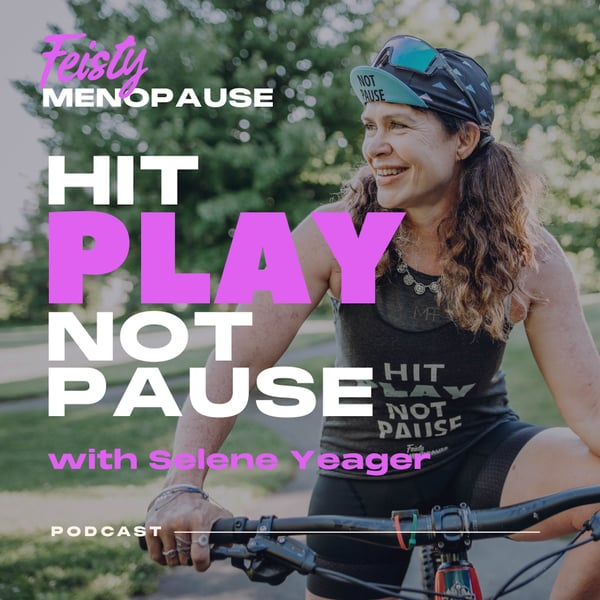Cardiovascular Disease & Brain Aging During Menopause with Rebecca Thurston, PhD (Episode 166)
Hit Play Not Pause
Hit Play Not Pause
4.9 • 696 Ratings
🗓️ 21 February 2024
⏱️ 58 minutes
🧾️ Download transcript
Summary
For years, hot flashes and night sweats (aka vasomotor symptoms) were considered just a “bothersome” part of being a menopausal woman: we were to wear layers, buy a fan, and soldier on. Then researchers started making some troubling connections between vasomotor symptoms and chronic disease. This week’s guest, Dr. Rebecca Thurston, is one of those investigators whose work shows that women with severe and/or persistent vasomotor symptoms have an increased risk for cardiovascular disease and changes in the brain that are linked to dementia. We dig into those findings and many more during this week’s episode.
Rebecca C. Thurston, PhD, FABMR, FAPS, is recognized nationally as a leader in the field of women’s health, particularly in the areas of menopause, trauma, cardiovascular disease, and brain aging in women. Her innovative research focuses on menopause, cardiovascular disease, and dementia risk in women, three prevalent and inter-related health issues that can have a profound impact on women's lives. She is Pittsburgh Foundation Chair in Women's Health and Dementia and Professor of Psychiatry, Epidemiology, Psychology, and Clinical and Translational Science, at the University of Pittsburgh. She also serves as Director of Women's Biobehavioral Health Program at the University of Pittsburgh as well as Cardiovascular Behavioral Medicine Research Training Program at the University of Pittsburgh. You can learn more about her and her work at UPMC.com
Resources:
Trajectories of Sleep Over Midlife and Incident Cardiovascular Disease Events in the Study of Women’s Health Across the Nation here
Trauma and its implications for women's cardiovascular health during the menopause transition: Lessons from MsHeart/MsBrain and SWAN studies here
Menopausal Vasomotor Symptoms and White Matter Hyperintensities in Midlife Women here
Menopausal Vasomotor Symptoms and Risk of Incident Cardiovascular Disease Events in SWAN here
Cognitive behavioral therapy for insomnia here
Brief behavioral treatment for insomnia here
Enroll in our Navigate Menopause Course - https://www.feistymenopause.com/navigate-menopause
Subscribe to the Feisty 40+ newsletter: https://feistymedia.ac-page.com/feisty-40-sign-up-page
Follow Us on Instagram:
Feisty Menopause: @feistymenopause
Hit Play Not Pause Facebook Group: https://www.facebook.com/groups/807943973376099
Support our Partners:
Hettas: Use code FEISTY20 for 20% off at https://hettas.com/
Midi Health: You Deserve to Feel Great. Book your virtual visit today at https://www.joinmidi.com/
Nutrisense: Go to nutrisense.io/hitplay and use code: HITPLAY to get $125 off
Previnex: Get 15% off your first order with code HITPLAY at https://www.previnex.com/
Paradis Sport: Use code: FEISTY20 for 20% off any single item at https://paradissport.com/
This podcast uses the following third-party services for analysis:
Spotify Ad Analytics - https://www.spotify.com/us/legal/ad-analytics-privacy-policy/
Podcorn -...
Transcript
Click on a timestamp to play from that location
| 0:00.0 | You are listening to Hit Play, Not Pause, a feisty menopause podcast for active performance-minded women. |
| 0:14.6 | I am your host, Celine Yeager. Each week, I bring you advice from athletes, scientists, researchers, and other experts to help you feel and perform you best no matter what your hormones are doing. |
| 0:25.0 | This show is a production of Live Feisty Media. |
| 0:31.0 | Hello, strong feisty women. |
| 0:33.5 | I hope you all are well. |
| 0:36.3 | Boy, do I have a great one for you this week. As anyone who knows me or |
| 0:41.5 | listens to this show knows, I am a research geek. I love research and I get pretty excited when I have |
| 0:48.6 | researchers on this show. And this week, I have one I've been wanting to talk to you for quite a while, |
| 0:53.8 | Dr. Rebecca Thurston. |
| 0:56.0 | Dr. Thurston is the past president of the Menopause Society, NAMS at the time, and she has been |
| 1:02.2 | involved in fascinating menopause research that I've seen her present at the annual meeting for |
| 1:07.9 | years and I've been following on all of the channels for a long time. |
| 1:13.5 | She is one of the investigators involved in Swan, which is the study of women's health |
| 1:18.6 | across the nation, an ongoing study funded by the National Institutes of Health, which examines |
| 1:24.1 | the physical, biological, psychological, and social changes during the menopause |
| 1:29.3 | transition. She also leads the Ms. Heart and Ms. Brain Studies, which look at menopause and |
| 1:35.5 | the cardiovascular brain connection. And her and her colleagues work here is so very important |
| 1:41.7 | as they objectively measure women's vasomotor symptoms, their hot flashes, |
| 1:46.9 | their night sweats, and establish connections and correlations to heart disease, dementia, |
| 1:53.8 | and other risk factors for women. It's really, really pivotal research. We cover all of that |
| 2:00.5 | during this conversation and then some. She is so deep in all of this research. We cover all of that during this conversation and then some. She is so deep |
| 2:04.1 | in all of this research. It's amazing. I could have talked to her all day. So I hope you enjoy this one |
... |
Please login to see the full transcript.
Disclaimer: The podcast and artwork embedded on this page are from Hit Play Not Pause, and are the property of its owner and not affiliated with or endorsed by Tapesearch.
Generated transcripts are the property of Hit Play Not Pause and are distributed freely under the Fair Use doctrine. Transcripts generated by Tapesearch are not guaranteed to be accurate.
Copyright © Tapesearch 2025.

